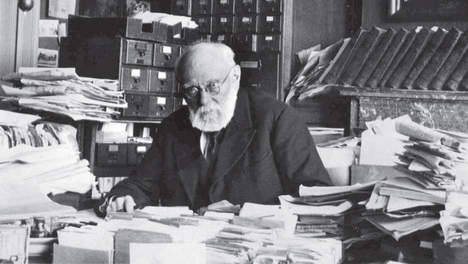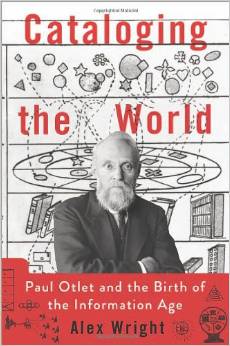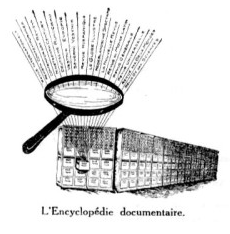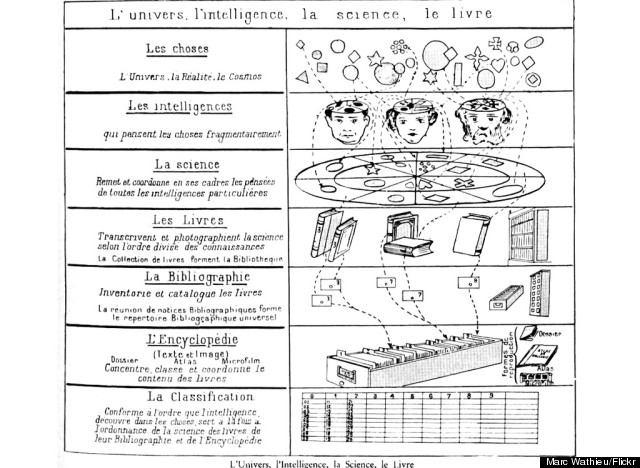
Paul Otlet : un belge visionnaire précurseur d’Internet
Francis Buekenhout attire notre attention sur un livre paru récemment
Cataloging the World : Paul Otlet and the Birth of the Information Age
par Alex Wright, Oxford University Press, 2014
Paul Otlet (1868-1944)

« Ce juriste belge fut un visionnaire, porté par un grand rêve. Les documentalistes le connaissent pour avoir inventé la CDU (Classification décimale universelle). Mais son projet était plus vaste : classer tous les savoirs du monde – livres, articles, photographies… – dans un lieu unique et centralisé. Avec le soutien du roi des Belges, le Mundaneum voit le jour au début des années 1920. Là des équipes classent, répertorient, rédigent des notices avec le but affiché de contribuer au progrès de l’intelligence en classant tout le savoir humain. Le temps passant, le projet prend de l’ampleur. P. Otlet rêve de construire une « cité mondiale » où seraient rassemblés tous les savoirs du monde, et dont Le Corbusier dessinera même des plans et maquettes.
En 1934, P. Otlet imagine dans un texte prémonitoire ce que sera Internet : « Ici, la table de travail ne serait plus chargée d’aucun livre. À leur place se dresse un écran et à portée un téléphone. Là-bas au loin, dans un édifice immense, sont tous les livres et tous les renseignements… De là, on fait apparaître sur l’écran la page à lire pour connaître la réponse aux questions posées par téléphone, avec ou sans fil. (…) Utopie aujourd’hui, parce qu’elle n’existe encore nulle part, mais elle pourrait bien devenir la réalité pourvu que se perfectionnent encore nos méthodes et notre instrumentation. »
Mais à partir des années qui suivent, P. Otlet perd peu à peu ses soutiens. Finalement le Mondaneum ferme au début des années 1930 et ses collections sont dispersées. Il ne désarme pas, continue de noircir ses carnets de nouveaux projets. En 1934, il publie son Traité de documentation, considéré comme l’ouvrage de base de la documentation moderne. Malgré une reconnaissance internationale, l’aspect utopique de ses projets l’isole de plus en plus… Devenu aveugle à la fin de sa vie, P. Otlet meurt en 1944. Son œuvre sombre dans l’oubli.
Depuis peu, on redécouvre P. Otlet. Il fut non seulement l’inventeur de la documentation moderne mais il avait imaginé Internet, le Web et même Wikipedia bien avant l’heure. Un film et une biographie lui ont été consacrés en 2006. »

“The dream of capturing and organizing knowledge is as old as history. From the archives of ancient Sumeria and the Library of Alexandria to the Library of Congress and Wikipedia, humanity has wrestled with the problem of harnessing its intellectual output. The timeless quest for wisdom has been as much about information storage and retrieval as creative genius.

In Cataloging the World, Alex Wright introduces us to a figure who stands out in the long line of thinkers and idealists who devoted themselves to the task. Beginning in the late nineteenth century, Paul Otlet, a librarian by training, worked at expanding the potential of the catalog card, the world’s first information chip. From there followed universal libraries and museums, connecting his native Belgium to the world by means of a vast intellectual enterprise that attempted to organize and code everything ever published. Forty years before the first personal computer and fifty years before the first browser, Otlet envisioned a network of "electric telescopes" that would allow people everywhere to search through books, newspapers, photographs, and recordings, all linked together in what he termed, in 1934, a réseau mondial—essentially, a worldwide web.

Otlet’s life achievement was the construction of the Mundaneum—a mechanical collective brain that would house and disseminate everything ever committed to paper. Filled with analog machines such as telegraphs and sorters, the Mundaneum—what some have called a "Steampunk version of hypertext"—was the embodiment of Otlet’s ambitions. It was also short-lived. By the time the Nazis, who were pilfering libraries across Europe to collect information they thought useful, carted away Otlet’s collection in 1940, the dream had ended. Broken, Otlet died in 1944.
Wright’s engaging intellectual history gives Otlet his due, restoring him to his proper place in the long continuum of visionaries and pioneers who have struggled to classify knowledge, from H.G. Wells and Melvil Dewey to Vannevar Bush, Ted Nelson, Tim Berners-Lee, and Steve Jobs. Wright shows that in the years since Otlet’s death the world has witnessed the emergence of a global network that has proved him right about the possibilities—and the perils—of networked information, and his legacy persists in our digital world today, captured for all time.”
Sources :
![]() http://www.scienceshumaines.com/paul-otlet-1868-1944-il-avait-reve-internet_fr_21257.html
http://www.scienceshumaines.com/paul-otlet-1868-1944-il-avait-reve-internet_fr_21257.html
![]() http://www.amazon.com/Cataloging-World-Otlet-Birth-Information/dp/0199931410
http://www.amazon.com/Cataloging-World-Otlet-Birth-Information/dp/0199931410
Lire aussi
![]()
Hoe een Brusselaar in 1934 internet bedacht
![]() This Man Imagined The Internet In 1895
This Man Imagined The Internet In 1895
![]() Une troisième biographie de Paul Otlet à paraître aux Etats-Unis
Une troisième biographie de Paul Otlet à paraître aux Etats-Unis
![]() Site du livre "Cataloging the World"
Site du livre "Cataloging the World"
- Podcast et RSS
- Plan
- Contact
- Mentions
- Aide
- Rédaction
- Se connecter

-
2006-2024 © UREM-ULB :
Unité de Recherche sur l’Enseignement des Mathématiques - Tous droits réservésCe site est géré sous SPIP 3.2.8 et utilise le squelette EVA-Web 4.2

Dernière mise à jour : mercredi 14 avril 2021
